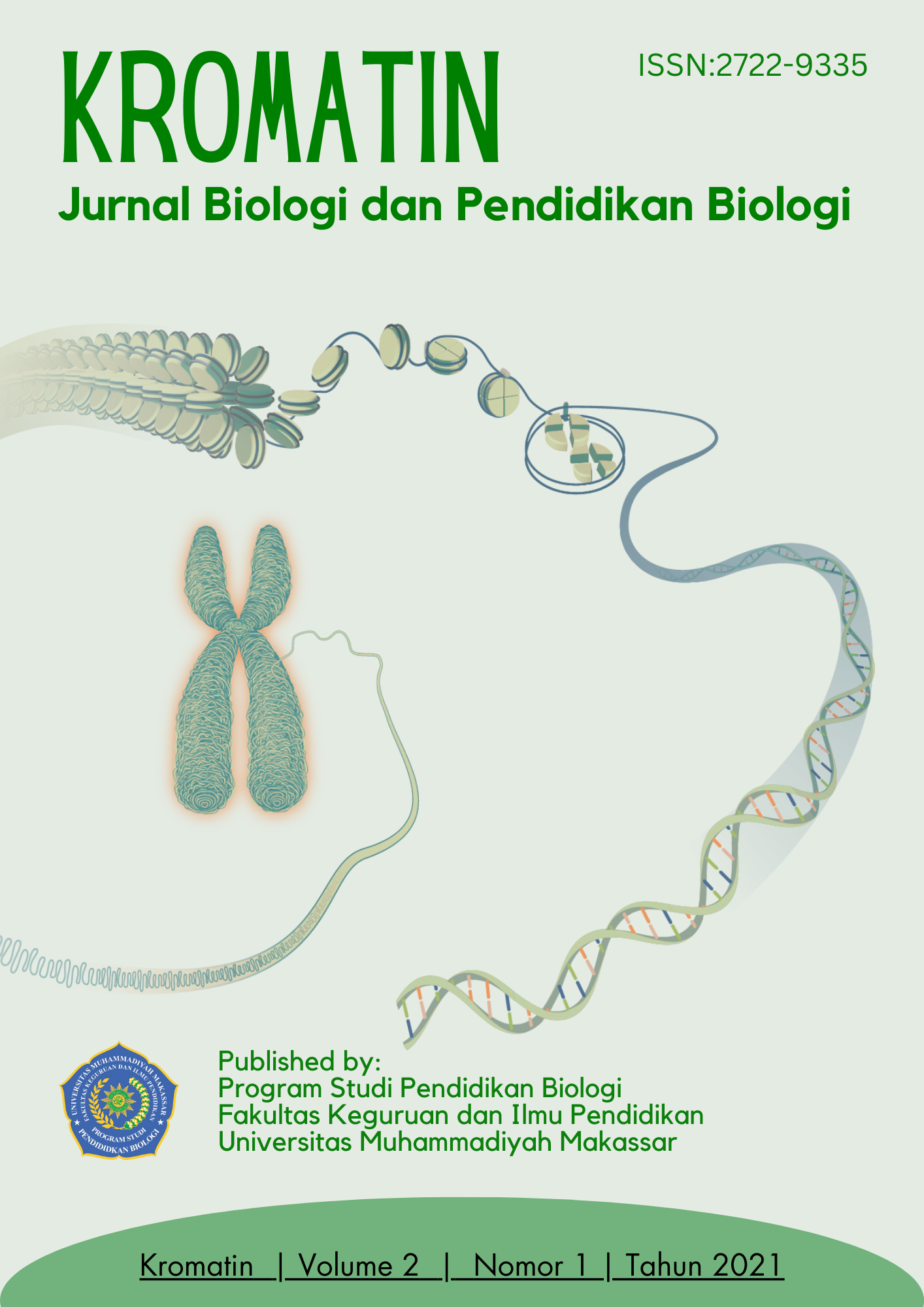Peningkatan Hasil Belajar Biologi Melalui Penerapan Model Pembelajaran Kooperatif Tipe Numbered Head Together (NHT) Pada Siswa Kelas VIII SMP Negeri 2 Rumbia
Abstract
Efforts to improve the quality of education are continuously being carried out, both conventionally and innovatively. This is even more focused after it was mandated that the goal of national education is to improve the quality of education at every type and level of education. This research is a classroom action research (Classroom Action Research) whose implementation consists of four stages, namely: (1) planning, (2) action implementation, (3) observation, (4) reflection. Based on the results of data analysis and discussion, it can be concluded that the learning outcomes of class VIII-1 students on the concept of the digestive system in humans who are taught using the NHT type cooperative learning model can increase. In the first cycle the average student learning outcomes were 64.76 and increased in the second cycle with an average value of 73.65. This increase in learning outcomes was also followed by an increase in student learning activities. Keywords: ptk, nht, cycle, conceptReferences
Angkowo, R. & A. Kosasih. 2007. Optmalisasi Media Pembelajaran. Jakarta. Grasindo.
Haling, Abd. 2004. Belajar dan Pembelajaran (Suatu ringkasan). Fakultas Ilmu Pendidikan UNM. Makassar.
Hamalik, Oemar. 1994. Proses Belajar Mengajar. Bumi Aksara. Jakarta.
Ibrahim, M., dan Nur, M., 2000. Pengajaran Berdasarkan Masalah. University Press. Surabaya.
Jati, Wijaya. 2007. Aktif Biologi 2. Ganeca. Jakarta.
Karmila, Sri. 2007. Peningkatan Aktivitas Belajar Siswa Melalui Penggunaan Model Pembeajaran Kooperatif Struktural Tipe Numbered Head Together (NHT) Pada Siswa SMA Negeri Makassar (Pada Materi Pokok Kelarutan Dan Hasil Kali Kelarutan). Skripsi Jurusan Kimia FMIPA. Makassar.
Lie, Anita. 2004. Cooperatif Learning. Grasindo. Jakarta.
_______. 1999. Model Pembelajaran Gotong Royong, Citra Media. Surabaya.
Mulyasa. 2003. Kurikulum Berbasis Kompetensi, Konsep, Karakteristik dan Implementasinya. Remaja Rosdakarya. Bandung.
Nasution, M.A. 1987. Kurikulum Dan Pengajaran. Bumi Akasara. Bandung.
Nurhayati B, Lukman Wellang Sappe. 2004. Strategi Belajar Mengajar. Universitas Negeri Makassar. Makassar.
Prawirohartono, Slamet. 2005. Sains Biologi 2b. Bumi Aksara. Jakarta.
Rahmawati. 2006. Meningkatkan Aktivitas Belajar Matematika Siswa Melalui Penerapan Model Pembelajaran Kooperatif Tipe Team Assisted Individualization (TAI) Pada Kelas VII SMP Negeri 3 Makassar. Skripsi. Jurusan Matematika dan Ilmu Pengetahuan Alam FMIPA UNM: Makassar.
Roestiyah. 1989. Didaktik Metodik. Rineka Cipta. Jakarta.
Sardiman, A.M. 2006. Ilmu Pendidikan. Pemaju Karya. Bandung.
Slameto. 2003. Belajar dan Faktor-faktor yang Mempengaruhinya. Rineka Cipta. Jakarta.
Sudjana, Nana. 2005. Penilaian Hasil Proses Belajar Mengajar. Remaja Rosda Karya. Bandung.
Syah, Muhibbin. 2003. Psikologi Pendidikan dengan pendekatan Baru. Remaja Rosdakarya. Bandung.
Trianto. 2007. Model-Model Pembelajaran Berorientasi Konstruktiistik. Prestasi Pustaka Publisher. Jakarta.
Downloads
Published
Issue
Section
License
Authors who publish with this journal agree to the following terms:
1. Authors retain copyright and grant the journal right of first publication with the work simultaneously licensed under a Creative Commons Attribution 4.0 Internasional License that allows others to share the work with an acknowledgement of the work's authorship and initial publication in this journal.
2. Authors are able to enter into separate, additional contractual arrangements for the non-exclusive distribution of the journal's published version of the work (e.g., post it to an institutional repository or publish it in a book), with an acknowledgement of its initial publication in this journal.
3. Authors are permitted and encouraged to post their work online (e.g., in institutional repositories or on their website) prior to and during the submission process, as it can lead to productive exchanges, as well as earlier and greater citation of published work.
Licence:
Authors are free to:
1. Share: Copy and redistribute the material in any medium or format
2. Adapt: Remix, transform, and build upon the material for any purpose, even commercially.
The licensor cannot revoke these freedoms as long as the authors follow the license terms, which include the following:
1. Attribution: Authors must give appropriate credit, provide a link to the license, and indicate if changes were made. Authors may do so in any reasonable manner, but not in any way that suggests the licensor endorses the authors or authors’ use.
2. No additional restrictions: Authors may not apply legal terms or technological measures that legally restrict others from doing anything the license permits.
This work is licensed under a licensed under a Creative Commons Attribution 4.0 Internasional License/ CC BY 4.0.


